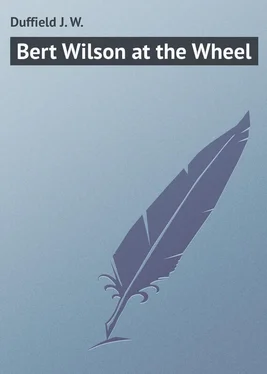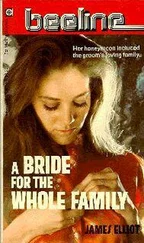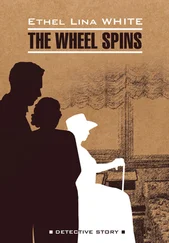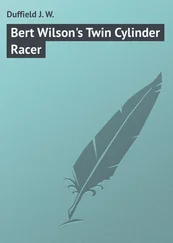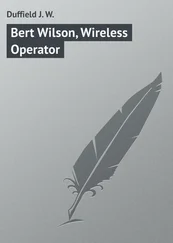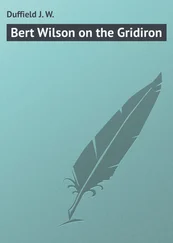J. Duffield - Bert Wilson at the Wheel
Здесь есть возможность читать онлайн «J. Duffield - Bert Wilson at the Wheel» — ознакомительный отрывок электронной книги совершенно бесплатно, а после прочтения отрывка купить полную версию. В некоторых случаях можно слушать аудио, скачать через торрент в формате fb2 и присутствует краткое содержание. Жанр: foreign_prose, foreign_children, на английском языке. Описание произведения, (предисловие) а так же отзывы посетителей доступны на портале библиотеки ЛибКат.
- Название:Bert Wilson at the Wheel
- Автор:
- Жанр:
- Год:неизвестен
- ISBN:нет данных
- Рейтинг книги:4 / 5. Голосов: 1
-
Избранное:Добавить в избранное
- Отзывы:
-
Ваша оценка:
- 80
- 1
- 2
- 3
- 4
- 5
Bert Wilson at the Wheel: краткое содержание, описание и аннотация
Предлагаем к чтению аннотацию, описание, краткое содержание или предисловие (зависит от того, что написал сам автор книги «Bert Wilson at the Wheel»). Если вы не нашли необходимую информацию о книге — напишите в комментариях, мы постараемся отыскать её.
Bert Wilson at the Wheel — читать онлайн ознакомительный отрывок
Ниже представлен текст книги, разбитый по страницам. Система сохранения места последней прочитанной страницы, позволяет с удобством читать онлайн бесплатно книгу «Bert Wilson at the Wheel», без необходимости каждый раз заново искать на чём Вы остановились. Поставьте закладку, и сможете в любой момент перейти на страницу, на которой закончили чтение.
Интервал:
Закладка:
Duffield J. W.
Bert Wilson at the Wheel
CHAPTER I
The “Red Scout”
“What dandy luck.”
“It’s too good to be true.”
“Who’d ever thought we’d have the luck to get it?”
“It can’t be true. I shan’t believe it till it gets here.”
“Anyway, it is true, and won’t we have the niftiest time ever?”
“Well, you might as well sit down, Bob. Running around like a hen with her head cut off won’t make it come any sooner.”
“Aw, how’s a fellow to sit still when a thing like that’s on the way? I wonder how long we’ll have to wait. What can be keeping him?”
A score of voices, talking singly, two together, all together, woke the woodland echoes, silent through the long winter and tardy spring, gone at last. Summer had come and with it the annual encampment of a score or more of manly, healthy youngsters, overflowing with animal spirits and vitality. For several years past, substantially the same group under the supervision of a Mr. Hollis, a gentleman of sterling character and considerable means, had gone into camp together for two or three weeks of the heated season. Brimming over with life, the boys always made the camp a lively place; but this summer a new and enveloping excitement seemed to have taken possession of everyone, and now all were plunged into a discussion of the cause of the hullabaloo, the voices rising higher and higher as each one sought to make himself heard above the rest.
Turning a bend in the road that brought the camp into view, Mr. Hollis, as he witnessed the excited gestures of the boys, and heard the volume of sound caused by every enthusiast trying to talk at once, instinctively quickened his pace, for it almost seemed as though a serious altercation were in progress; but as he came near enough to distinguish words and heard – “Six cylinders,” “Forty-eight horsepower,” “Chrome nickel steel,” “Wheel base one hundred and twelve inches,” “Diamond tires,” “Autometer,” “Safety treads,” “Grip treads” – he realized that nothing more serious was going on than a discussion of the relative merits of automobiles and their fittings. No wonder there was gesturing and loud talking. What boy would not rise to the topmost heights of enthusiasm at the thought of an automobile in which he was to have a personal interest? Such a delight had come to the camp, and since the announcement in the morning that on account of the long trips that the summer’s plans would make necessary, the boys would be allowed an automobile for their own exclusive use, nothing else had been thought or talked about; and each eager boy was impatiently awaiting the return of Mr. Hollis to learn the make and all other details of that most wonderful car.
Now, as he came into camp, the boys crowded around him and the wood rang with cheers as he told them that the car would arrive the following morning. A volley of questions overwhelmed him: “How large is it?” “What speed?” “What color is it?” “How many of us can ride in it at a time?” Question followed question in quick succession, until Mr. Hollis put his hands over his ears, and, refusing to answer any more, proposed dinner as a means of quelling the noise.
The boys could scarcely have told of what their dinner consisted that night, so great was their excitement. All were glad to turn in early as the surest way to bring the morning and the longed-for car. A full hour earlier than usual the lights were out and silence settled over the camp, broken only by nature’s mysterious night sounds. A belated rabbit homeward bound, keeping ceaseless vigil with round bright eyes, encouraged by the unusual quiet, crept close to the door of the mess tent, and snatching a stray cracker from the grass, scurried joyfully away. At the distant menacing “Tu-whit, tu-whoo” of the night owl, the birds stirred uneasily and nestled closer under cover of the sheltering leaves. The quiet hours crept on till at last morning dawned and gave promise of a glorious day.
Frank Edgewood was the first to open sleepy eyes, and seeing a few clouds not yet dissipated by the early sun, woke the camp with the dismal wail: “Fellows, it’s going to rain.”
“Put him out,” “Smother him,” “Duck him in the brook,” came in a chorus; and Frank, taking to his heels, dropped the flap of his tent, with not a moment to spare.
“Run early and avoid the rush,” sang out Tom Henderson.
“To pass he had such scanty room,
The descending grazed his plume,”
chanted Dick Trent.
“Let’s forgive and forget,” said Ben Cooper.
“Be glad we let you live, Frank,” Bob Ward chimed in; and so the culprit, reassured, ventured out to breakfast.
Again the all-absorbing topic was renewed, two vital questions claiming them. What should they name their auto? Who would be able to run it? The first was easy enough, for almost from the first they had decided, the color permitting, to call it the “Red Scout.” The second was not so easy, for Mr. Hollis must be assured, for the sake of the general safety, that the driver should be fully capable. If only Bert Wilson were there, the question would be answered, for capable Bert in New York had studied the mechanism of automobiles and grown very proficient in handling them; but they were not sure that he would be able to be in camp with them this year. Expressions of regret were heard on all sides, for Bert had a very warm place in their hearts. His splendid qualities had easily made him their natural leader and his absence was far more keenly felt than that of any other fellow in the camp would have been.
Still, Bert not being there, they must choose someone else, so Mr. Hollis called for volunteers. Several answered, but their qualifications were rather doubtful, until Bob Ward said that he had had a lot of experience in driving his uncle’s machine, and felt very sure he could handle it. So it was decided that the next day Bob should take them on their first trip, which would be in search of a new camp site, the old one proving too small for this year’s requirements.
While the question as to who should be chosen to drive the automobile was being decided, Sam Fielding and Philip Strong, two of the younger boys, had placed a long plank over a big rock which rested under the shade of a low-branched tree, and thus improvised a capital see-saw. When the question was settled, there was a general movement among the boys, and one of them, thoughtless of consequences, jumped upon Sam’s end of the board. This added weight gave the other end a sudden jerk upward, and in a twinkling Philip was tossed into the boughs of the tree, where, his foot catching in a forked branch, he hung suspended, head downward, his jacket falling about and covering his head and face, while he yelled like a Comanche Indian.
In an instant the entire camp was aroused and Phil was quickly extricated from his uncomfortable position. At the sight of his astonished face, the whole camp went into paroxysms of mirth, while peal after peal of laughter made the woods echo again. Even Phil, now “right side up with care,” could not resist the contagion and joined in the merriment.
It was many minutes before a normal condition of things was re-established, but at last the boys fell to discussing the proposed change of camp.
“It’s a shame that we have to change,” said Charlie Adams; “I don’t believe we’ll have such bully times in the new camp as we have had here.”
“Oh, I don’t know,” said Tom cheerily; “we’ll have the dandiest fun, hunting new caves and things.”
“It will at least have the charm of novelty,” joined in Dick Trent – Dick was eighteen and sometimes used words and phrases so ponderous as to give him added dignity in the eyes of the other fellows. “Things will be altogether different this summer,” he went on; “having the auto will make a great change.”
Читать дальшеИнтервал:
Закладка:
Похожие книги на «Bert Wilson at the Wheel»
Представляем Вашему вниманию похожие книги на «Bert Wilson at the Wheel» списком для выбора. Мы отобрали схожую по названию и смыслу литературу в надежде предоставить читателям больше вариантов отыскать новые, интересные, ещё непрочитанные произведения.
Обсуждение, отзывы о книге «Bert Wilson at the Wheel» и просто собственные мнения читателей. Оставьте ваши комментарии, напишите, что Вы думаете о произведении, его смысле или главных героях. Укажите что конкретно понравилось, а что нет, и почему Вы так считаете.
